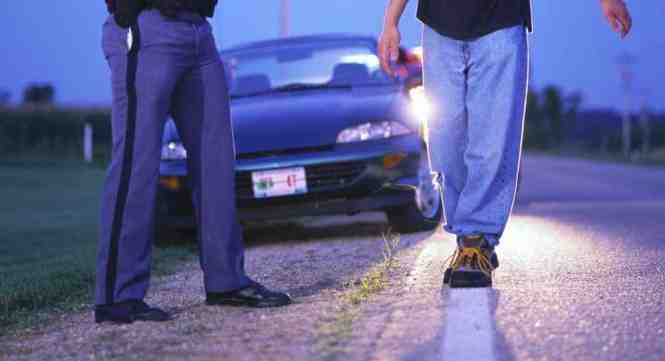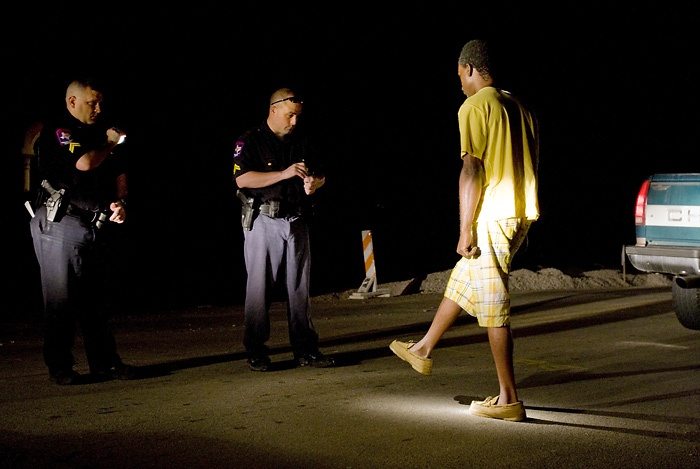
It is not uncommon for a law enforcement officer in Florida to request that a driver take field sobriety tests. If you are in an accident or stopped for some reason, the officer may ask you if you have been drinking and request that you perform a few roadside tests, such as walking heel to toe in a straight line, or holding your foot six inches above the ground while counting. But does Florida law actually make it mandatory to take these roadside field sobriety tests?
The answer is no. Florida law does not authorize a law enforcement officer to force a driver to perform field sobriety exercises.
When the police pull over a driver, the officer will look for signs of impairment from drugs or alcohol. They will listen for slurring of words and will try to detect the smell of alcohol on the driver’s breath. They will look to see if the driver’s eyes are bloodshot, or if the driver has trouble finding their license and registration. If the police officer suspects that the driver may be impaired, they can request a field sobriety test on the driver.
We asked our principal DUI attorney in Tampa, David Hardy, about the law surrounding field sobriety tests in Florida.
Can You Refuse to Perform a Sobriety Test in Florida?
There is no Florida law that requires a Florida driver to take a field sobriety test. However, refusing these tests can put a driver in a difficult spot.
When a police officer suspects that a driver is impaired, and that driver refuses to perform field sobriety exercises, the officer will tell the driver that even though Florida law does not obligate the driver to perform the exercises, the exercises are an opportunity for the driver to dispel the officer’s suspicion that the driver is under the influence. So, the officer presents the field sobriety exercises as a chance to avoid arrest.
Frequently, the officer will also tell the driver that if the driver does not perform the field sobriety exercises, that the officer will decide whether or not to arrest the driver based on the officer’s observations up to that point. Basically, what the officer is telling the driver is that if the driver does not perform the exercises, the officer is going to arrest them.
Florida State Statute 316.1932 – Implied Consent Law Explained
Florida State Statute 316.1932 is known as the “implied consent” law. The implied consent law states that a person who accepts the privilege of operating a motor vehicle in Florida is deemed to have given his or her consent to submit to a breathalyzer test if the person is lawfully arrested for any offense allegedly committed while the person was driving or was in actual physical control of a motor vehicle while under the influence of alcoholic beverages.
The chemical breath test must be incidental to a lawful arrest and administered at the request of a law enforcement officer who has reasonable cause (or reasonable suspicion) to believe that the person was driving or was in actual physical control of the motor vehicle under the influence of alcoholic beverages.
The person must be told that his or her failure to submit to any lawful test of his or her breath will result in the suspension of the person’s driver’s license 1 year for a first refusal, or for a period of 18 months for a second refusal. Further the person must be told that if they have refused a breath to chemical test in the past, that they state may charge them with a first degree misdemeanor.
So, you might be thinking – if I have a driver’s license from another state, does this Florida statute still apply to me? There are no loopholes for non-Florida driver’s license holders. The statute still applies to them due to the second criteria of the statute.
What is Reasonable Suspicion?
In order for a Florida law enforcement officer to pull a driver over for suspicion of impaired driving, the officer needs to have a reasonable suspicion that the driver is under the influence of drugs or alcohol to the extent that their normal faculties are impaired.
There are no exact criteria for “reasonable suspicion.” The officer will determine if he or she thinks there is reasonable suspicion based on his or her experience and training.
Typically, here is what police officer’s look for before making a traffic stop:
- Driving slower or faster than other drivers
- Nearly avoiding collisions
- Tailgating
- Swerving, breaking fast, and other erratic behaviors
- Illegal turns and other maneuvers
- Driving the wrong direction on a roadway
- Passing over the center lines
- High beams turned on into incoming traffic
- Headlights off while driving
An officer may develop a reasonable suspicion that a person is under the influence of alcohol or drugs based upon the following:
- Slurred speech
- Bloodshot eyes
- Watery eyes
- Slow reaction to questions
- Smell of alcohol
- Visible open alcohol containers
- Fumbling with their license and registration
Types of Testing
In the state of Florida, there are three types of tests the police officers can perform on drivers.
- Breath test – Commonly known as a Breathalyzer. It uses infrared light to measure the Blood Alcohol Content (BAC) of the person. It is the most common chemical test performed in DUI matters. It can be done when you are pulled over or at the police station.
- Urine test – Urine tests are used to check for drugs, like marijuana.
- Blood test – Blood tests also measure BAC; blood is drawn from the suspected intoxicated driver and analyzed for BAC levels.
Florida Maximum BAC Levels
The state of Florida defines a 0.08% BAC (blood alcohol content) or higher as illegal to drive for those over the age of 21 years. If you’re younger than 21, the limit drops to 0.02%, as mandated by Florida’s zero-tolerance policy for drinking under that legal age.
What is Involved in a Field Sobriety Test?
A field sobriety test is a series of tests that law enforcement can carry out to determine whether or not you’re under the influence of drugs or alcohol.
They usually include:
Walk and Turn Test
The walk and turn test is designed to help determine if individuals are under the influence of alcohol. During the walk and turn test, the officer will instruct the driver to walk nine steps, heel-to-toe in a straight line, before turning on one foot and walking back nine steps, heel-to-toe in the opposite direction.
While the driver is doing the walk and turn test, the police officer will look for these seven signs of impairment:
- Not touching heels to toes
- Inability to keep balance while listening to the instructions
- Starting to walk before the instructions are finished
- Stop walking to regain control of balance
- Use of arms for balance
- Takes more or less than nine steps
- Loss of balance while turning
Suppose the driver undergoing the sobriety test has two or more of the above indications. In that case, the officer will consider the driver as impaired and ask the driver to perform a breathalyzer test. NHTSA (National Highway Traffic Safety Administration) says there’s nearly a 70% chance that their BAC level is 0.1 or higher.
One Leg Stand Test

The one-legged foot stand test is used as another sobriety test used by officers to help determine if drivers are impaired by alcohol or drugs.
For 30 seconds, the officer will observe the driver and look for the following indicators of intoxication:
- Putting the foot down early
- Swaying back and forth
- Use of arms for balance
- Bouncing or hopping to maintain balance
Similar to the walk & turn test, if the driver fails two or more of the above indicators of intoxication, there is a 65% chance they have a BAC greater than 0.10% or more.
Horizontal Gaze Nystagmus
The horizontal gaze nystagmus test is used to determine a driver’s impairment by observing the motion of their eyeballs while tracking a moving object.
First, let’s define horizontal gas nystagmus; it is the involuntary “jerking” that happens to the eyeballs when they are rotated to high peripheral angles. It normally occurs even while people are sober. However, when they are intoxicated, the jerking becomes more pronounced and occurs at smaller angles.
During the test, the officer will observe the driver for the following:
- Distinct jerking of the eye at the max deviation
- The eyes can’t smoothly follow the object
- The jerking onset is within 45 degrees
According to the NHTSA, there’s a 77% chance the driver is impaired with a BAC of 0.10% or greater if they have four or more of the above indications between the two eyes.
Is it Possible to Do Poorly on the Exercises While Sober?
A lot of people wonder, “Can these tests show that I’m drunk if I’m not drunk?” Unfortunately, field sobriety tests get a lot of “false positives.” In other words, many completely sober Florida drivers have done poorly on field sobriety tests.
In many of these cases, the driver was simply nervous, tired, had medical issues preventing proper balance, or any combination of these effects, which officers mistake as an effect of alcohol.
Conclusion
In Florida, refusing to perform a sobriety test based on suspicion of drunk driving is not against the law but can lead to a misdemeanor charge, a license suspension of up to one year – if you refuse it for the second time. If you’re arrested and charged with “drunk driving,” there are a few options you may want to explore.
You will want to take time to really understand the charges and if it’s in your best interest to fight them or just accept them. Thankfully, The Hardy Law Firm can help. Reach out today to our specialist DUI attorneys in Tampa, Florida, if you have questions after refusing a field sobriety test or getting charged with a DUI.
Posted in Florida DUI Defense
